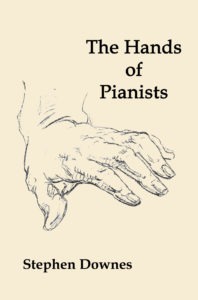 Actually, nowhere is a good country for elite young pianists. Especially terrifying is the stage of a 2000-seat concert hall where a big black Steinway is waiting to abuse you.
Actually, nowhere is a good country for elite young pianists. Especially terrifying is the stage of a 2000-seat concert hall where a big black Steinway is waiting to abuse you.
Formidable Australian pianist Noel Mewton-Wood had just turned 31 when he drained a tumbler of liquid cyanide in the front room of his home, now in a posh inner-London suburb. Mewton-Wood had recently lost his partner Bill. But he was a promiscuous homosexual, and it was 1953.
Were the police about to nab him? Was someone blackmailing him? Was a former lover about to talk to the Press? Or was being a top pianist just too hard? What’s the full story?
The narrator of my novel The Hands of Pianists sets out to prove that pianos can kill and maim elite pianists. He aims to find out as much as he can about the violent deaths at 31 of three great artists. Decades ago, he held a saw that severed his sister’s fingers. A highly talented pianist, she was unable to cope with losing her career and committed suicide.
The narrator goes on a quest for absolution that takes him from Melbourne to Sydney (via Geelong), the south of France, London, Sussex, and the Czech Republic.
Published by Fomite Press in the US, Hands comes out on 4 March. Readers who like challenging and thoughtful books should love it. The great Liszt pianist Leslie Howard calls it ‘rich and remarkable, full of wisdom, doubt, intense curiosity, myriad detail and an abundance of pictorial skill’. Sebald scholar Deane Blackler says it offers ‘much to reflect on, a great deal to admire, and perhaps a little to fear’.
And, yes, it’s punctuated with grainy black-and-white photos in the style of W. G. Sebald.
John Amis, the radio and TV personality who starred in the much-loved British game show My Music, wrote about his friend Mewton-Wood in his autobiography Amiscellany. The narrator of Hands scrutinises the book in the State Library of Victoria’s much-vaunted reading room. He discovers new things about both the pianist and Mewton-Wood’s mother, who was central to his success. The narrator writes:
Amis also knew Dulcie, whom he describes as great fun, a craggy witch like a thinner and older Dame Edna Everage, a woman who was crafty and bossy and had a dangerous habit, he says, of giving you a friendly tap on the balls if she liked you. Her son never quite made the big time as Clifford Curzon, Solomon and Dame Myra Hess had done because he lacked enough popular appeal and played too much out-of-the-way and modern music. He never got around to asking Noel if he was queer, and his friendship eased after Noel and Bill Federick told a joke that ridiculed heterosexuality. Amis had just married Olive. Amis once told Noel that he appeared to mince as he walked on stage. The pianist was so horrified that he never walked that way again, although he did take to wearing medallions on chains. He says that Noel never forgave himself for ignoring Bill’s last bout of abdominal pains, which preceded his death. Almost immediately, the pianist tried to kill himself with umpteen aspirins, writes Amis, surviving only because medical friends washed him out. A week or so later, Noel telephoned him, and they chatted for more than an hour. Noel said he thought he was getting over Bill’s death, and they discussed his plans for the future. Amis thinks the telephone call was an attempt to say goodbye, because the next day, the 5th of December, 1953, Noel drained his fatal draught of prussic acid.
See @closemdownes and Instagram HandsofPianists. The Hands of Pianists (Fomite Press). Available from most online booksellers in print ($A25.95) and ebook ($8.95) formats.